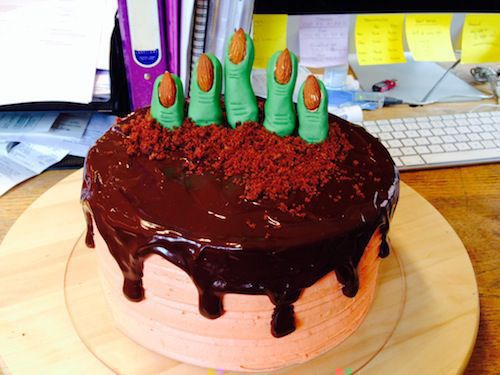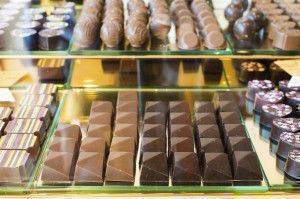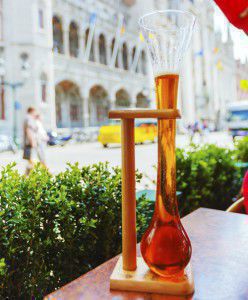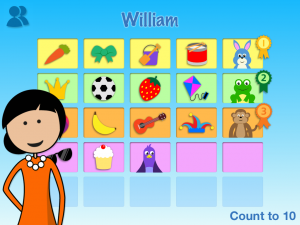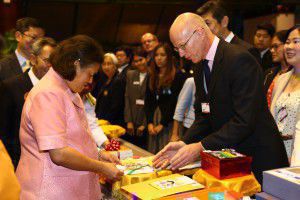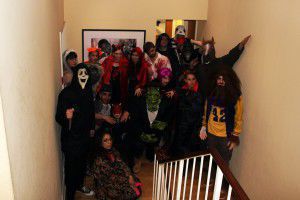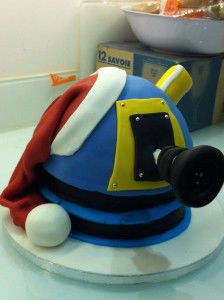When is a cake not a cake?
You might not believe it, but I regularly arbitrate fairly ferocious arguments about cake. And it’s not because my colleagues can’t share cake (although this has been known to be a problem in the past).
The reason is that this little word, which you would think would be a simple thing to translate, actually gets people quite upset. Throughout the world, different sorts of cake prevail, and some people (understandably) get quite grumpy when you present them with the wrong type of cake. It’s important stuff.
 One of our most recent additions to the uTalk app is Esperanto, where we had to make a very difficult decision about whether to translate the phrase ‘piece of cake’ (available in uTalk Essentials because, let’s face it, it’s essential vocab), as ‘peco da torto‘ or as ‘peco da kuko‘. For English speakers, ‘kuko’ was favoured because it is close to ‘cake’, and therefore brings to mind a big, squashy Victoria sponge. ‘Torto’, on the other hand, inevitably conjures something which is not a cake at all, but a tart – or even a flan: something flimsy and possibly, horror of horrors, covered with fruit.
One of our most recent additions to the uTalk app is Esperanto, where we had to make a very difficult decision about whether to translate the phrase ‘piece of cake’ (available in uTalk Essentials because, let’s face it, it’s essential vocab), as ‘peco da torto‘ or as ‘peco da kuko‘. For English speakers, ‘kuko’ was favoured because it is close to ‘cake’, and therefore brings to mind a big, squashy Victoria sponge. ‘Torto’, on the other hand, inevitably conjures something which is not a cake at all, but a tart – or even a flan: something flimsy and possibly, horror of horrors, covered with fruit.
Nonetheless, in the final stages of the battle, ‘peco da torto’ won, and went through to the final translation. Here’s why: our app is used all around the world by people who can learn from their own native language: we currently have 128 languages in uTalk, and people can learn any one of these from any other. For Esperanto, this is particularly important, because Esperanto is a language that nearly all Esperantists (barring a maximum of a few thousand native speakers) speak as a second language, making the Esperantist community very multinational.
So we want to make our Esperanto translation as internationally relevant as possible. And for most Europeans, at least, ‘torto’ will bring to mind a fairly generic type of cake, whereas ‘kuko’ might be slightly less familiar. Taking just a few European languages, we’ll see that in Russian we have торт, Italian torta, Dutch taart, Spanish tarta, Croatian torta, Hungarian torta. Both options would have worked, but ‘torto’ won the more international vote, and when it comes to Esperanto that’s a pretty important factor to consider.
What do you call a cake in your language? Let us know!
Nat
Halloween around the world
Halloween is one of the world’s oldest celebrations, dating back to possibly 500 AD in Ireland. The celebration was originally the ‘Celtic feast of Samhain’, a pre-Christian festival that began at sunset on 31st October and ended at sunset on 1st November. It was meant to be the night when the veil between this world and the other was at its thinnest, and the dead were very near.
 Today Halloween is celebrated in a number of countries across the world. In Mexico and other Latin America countries, Día de los Muertos (the Day of the Dead) honours deceased loved ones and ancestors. The festival runs from midnight on 31st October until 2nd November. Traditionally 1st November is the day for honouring children that have passed, whereas 2nd November is the day for honouring the adult spirits. Families traditionally construct an altar for the dead and decorate it in sweets, flowers, photographs and the deceased’s favourite food and drink. Often a washbasin is left outside with a towel so the spirit can wash before indulging in the feast. Many people around the world, even if they are not directly connected to Mexican culture, are drawn to the concept and imagery of Mexico’s Day of the Dead, so it is continually growing in popularity.
Today Halloween is celebrated in a number of countries across the world. In Mexico and other Latin America countries, Día de los Muertos (the Day of the Dead) honours deceased loved ones and ancestors. The festival runs from midnight on 31st October until 2nd November. Traditionally 1st November is the day for honouring children that have passed, whereas 2nd November is the day for honouring the adult spirits. Families traditionally construct an altar for the dead and decorate it in sweets, flowers, photographs and the deceased’s favourite food and drink. Often a washbasin is left outside with a towel so the spirit can wash before indulging in the feast. Many people around the world, even if they are not directly connected to Mexican culture, are drawn to the concept and imagery of Mexico’s Day of the Dead, so it is continually growing in popularity.
Halloween in the Philippines is called Pangangaluluwà, which is sadly a tradition that is dying out. They have a slightly different version of trick or treating, where children go from door to door and offer a song in exchange for food or money. However, it’s not just any food they are offered; it is a kind of Filipino version of a soul cake, as they believe that every cake eaten is a soul set free in purgatory. The carollers would also be allowed to steal sundry items from the houses that they visit, such as clothes from a clothesline, eggs, vegetable and fruit. The homeowners would explain the thefts by saying it was the ‘spirits returning to the world of the living’.
It wasn’t until the 19th Century that Halloween reached America, and they do things slightly differently to us Brits. ‘Across the Pond’, Halloween marks the beginning of ‘fall’ (autumn). For families it is a time to prepare and create costumes together, compared to Brits, who normally buy pre-made outfits. In the U.S., they also have a slight twist on what to do with the ‘pumpkin guts’ after carving their jack o’lanterns; instead of throwing them away, they roast the remains with salt and cinnamon (I have to say I am very tempted to try this). When it comes to decorating their houses they also take it one step further than our pumpkin outside of your door. (I wish this were the case over here).
Here at EuroTalk we are all dressed up for the big day, from the scary (Frankenstein, skeletons and a bat) to the not so scary (Minnie Mouse, Where’s Wally – or Waldo to our American friends – and a giant baby). And of course, there’s cake. (That’s not necessarily traditional for Halloween in the UK – we just love cake.)
Happy Halloween!
Amy
10 reasons to visit… Bruges
Have you ever visited a city that managed to change your mind?
I visited Bruges earlier this year. Unfortunately, I’d accidentally timed my visit to coincide with the enthusiastically named ‘Amateur Arts Festival’, and consequently spent Saturday night with tissues rammed in my ears and arms clenching pillows to my head, as my hotel room shook with the relentless noise of amateur bass. I thought then that the chances of coming up with ten reasons to visit Bruges were pretty slim. Yet on Sunday morning, with the loudspeakers in the square finally silenced and the sun out, I became enchanted with this town that everyone always refers to as a peaceful haven of canals. These are the things which managed to turn my opinion around in the space of just one morning.
1. Trains
I get a bit excited about foreign trains, I know, but going to Bruges presented me with a new wonder: the double decker train. True, this is not localised to Bruges alone but most of the IC trains from Bruxelles seemed to be two storeys high, giving a fantastic view of the very flat countryside (and occasional windmill!) from the top deck. The trains are smooth and cool, and the conductors wear an amusing flat cap as part of their uniform. If you’re just planning a short visit to Bruges, you can get the Eurostar to Brussels and travel on from there (it’s about an hour on the fast train, two hours on the slow train).
2. Canals and boat trips
I wouldn’t say the town is riddled with canals in the same way Venice or Amsterdam are, but they linger in the backstreets and circle the centre so that you stumble across them when you wander off the main street. Surprisingly, there didn’t seem to be any locals drifting around on pleasure boats, although there were a few promising houses whose main doors seemed to lead out directly onto the canal. Activity on the waterways instead seemed to be wholly dominated by the tour boats, taking cargoes of visitors on half hour drives up and down the canal, streaming off fluent speeches in three languages as they went. If you’re only there for a short time, I’d advise a boat trip to get your bearings on the town, and to see some impressive buildings from otherwise undiscovered angles.
3. Chocolate
Belgium is world-famous for chocolate and there are lots of chances to sample it in Bruges. Having been there just after Easter, lots of independent chocolate shops were still displaying elaborate chocolate rabbits and chicken-shaped Easter eggs, as well as the usual array of picturesque truffles and pralines. It being the weekend, there didn’t seem to be anyone around making the chocolates, which was a pity, but I imagine that in the week you’d get a good look at the chocolatiers at work. I was particularly impressed with a small boutique called Stef’s, which sold chocolate tools dusted with cocoa to make them look rusty – I was entirely taken in until I decided it was highly unlikely that a food shop would fill its window with rusty tools.
4. Walking
Bruges, although it also has lots of famous sights, is perfect for the lazier tourist who just wants to meander and drink in the tranquil beauty. Cobbled streets with broad flat pavements and gentle bridges over canals provide a little haven to lose yourself in, and since the whole town is very small you soon enough stumble upon some familiar street or building to set you back on route. Horse drawn carriages trot past every so often, carrying bands of eager-eyed tourists, A particularly pretty walk turned out to be the wide promenade from the station into town (a very short stroll and definitely not worth getting the bus unless you have heavy luggage), which passes a beautiful pink-flowered war memorial and glides into the centre of town and some pretty little cafés.
5. Houses and architecture
The typical Flemish façade presides here, and people seem to take enormous pride in their property, keeping every gate neatly painted and every tile in place. With a maximum height of 30m for any building in the city, the scenery is all low-lying and the views from any high points are panoramic. Some interesting and very modern architecture brings a new sense of style to the traditional steep-roofed old houses.
6. Brewery
At one point home to over 50 breweries, Bruges now has only one active one, De Halve Maan brewery, which runs daily tours around its compact factory in the heart of the city. The tour, in Dutch, French and English, is definitely worth going on as it is stuffed full of information and lots of insights into why beer is healthy (an argument I always like to hear). They’ll also tell you that back in the ’50s the breweries would do home deliveries – you just had to ring a bell for the cart to stop and dispense beer to you directly. I imagine it’s no longer feasible to re-introduce this practice, but we can always dream… Having climbed right to the top of the factory and experienced the lovely view, you are released at ground level to claim your free beer in the spacious bar-restaurant, where one beer can easily turn into a happy afternoon sampling all the brewery’s many offerings.
7. Bike pumps
I’ve seen these around a little more recently – the free foot-operated bicycle pump – and I’m always impressed with a town that spends its money on something as practical and helpful as this.
8. Coffee…
and cake. This doesn’t need much explanation really: in Bruges, you can sit at a table on a cobbled pavement outside a bakery with exquisitely executed cakes and sip a small cup of intense black coffee. Although waffles seem to be the thing to have in Belgium, my favourite snack is the florentine – not a native Belgian sweet but nonetheless available in every cake shop.
9. Beers and beer glasses
Almost as attractive as the idea of sitting in a bar all day trying all the different beers is the idea of trying out all the different glasses. That may sound geeky but there are some really fun ones, including the absurd Kwak beer glass whose bulbous end makes it impossible to put down without the proper stand, and the La Corne drinking horn (which you can clink with a fellow Viking over a drinking toast and which, again, cannot be propped up except with the stand it comes served in). Good bartenders, the Belgians will tell you, will never serve a beer in the wrong glass, and each beer has its own glass, most of which are shaped like a chalice or a tulip.
10. Shopping
If this is what you’re after, you won’t be disappointed in Bruges. With a long, meandering high street full of clothes and chocolate shops, as well as a large market and side streets offering endless souvenirs, you could spend a day just in the shops. And if you’re looking for a bigger centre, Brussels is only an hour or so away by train, and Ghent is neatly stuffed in between the two, to make a weekend of it.
Have you been to Bruges? What were your highlights?
Nat
EuroTalk: a look back at 2013
It’s been another busy year at EuroTalk, with new products, new languages… and a new puppy. Throw in a royal encounter and a cake that looks like a Dalek, and you’ve got the makings of an interesting twelve months.
Languages
In June, we launched our new app for iPhone and iPod touch, uTalk. This had been in development for a long time, and we were really proud and excited to be able to share it with the world. It’s got more content and more activities, and it’s free to download and start learning the essential words you need to get by in 60 languages. We’ve been adding more languages regularly since the app was launched, and will continue to do so over the coming months. So if we haven’t yet got the language you need, don’t worry – we soon will.
And that’s not all. Last month, we added Lao, the official language of Laos and also spoken in the north east of Thailand, to our range with the release of Talk Now, our beginner program for PC and Mac. Lao has about 15 million speakers worldwide, and is a language we’ve been wanting to offer for some time now. There are more new languages on the way in 2014, so watch this space…
Maths
This year also saw the launch of part 2 of our second maths app, Maths, age 4-6, and two new practice apps – Count to 10 and Count to 20. We also released a version of Maths age 3-5, for schools, so teachers can use the app in the classroom.
Malawi
We’ve been working in Malawi now for several years, as part of our mission to ensure one billion primary age children reach their full potential in numeracy, reading and English. This year, Dr Nicola Pitchford from the University of Nottingham conducted an evaluation at Biwi Primary School in Malawi, to measure how effective our maths apps are for the children’s learning, compared to other teaching methods, including other apps. The preliminary results show that not only did the group using our apps perform significantly better than the other groups, but in fact they tripled their maths knowledge in just eight weeks. This is really exciting and encouraging, and we hope now to scale up the project in Malawi to reach more children, in more schools.
Junior Language Challenge
2013 saw the return of the JLC, after a year off in 2012. Our annual language learning competition for primary age children across the UK is always very popular, and this year was no exception. We were joined at the final by Martha Payne of NeverSeconds, who at just 10 years old, has raised over £140,000 for Mary’s Meals, a charity providing school dinners to children in Malawi. Martha, with her dad and her sister, was our special guest and handed out the prizes to our finalists, including the JLC Champion for 2013, Ella Whittingham from West Bridgford, Nottingham.

Martha Payne with JLC Champion Ella Whittingham, runners-up Morgan Fry and Tudor Mendel-Idowu, and EuroTalk Chairman Richard Howeson
A Royal Visit
In October, Steve was honoured by a visit from Her Royal Highness Princess Maha Chakri Sirindhorn of Thailand, while at an exhibition in Bangkok. The Princess came to have a look at the EuroTalk stand, and later Steve presented her with a gift on behalf of the company. He had to be instructed on the correct way to bow, and fortunately he got it right!
New arrivals
This year, we’ve said a sad goodbye to Glyn, Tom and Hanna, but welcomed Safia, Seb and Pablo. We’ve also been lucky to have Lorena with us from Germany for a few months; you may have enjoyed some of her blog posts! And in August we welcomed Molly the puppy, who caused a certain amount of mayhem, but was very easily forgiven because she’s so cute.
Fancy dress fun
We entered into the ‘spirit’ of Halloween by getting dressed up for the occasion. With everything from vampires to skeletons, pumpkins to werewolves, we were quite a sight to behold. Although some of us were scarier than others…
Lots of cake
We’ve always enjoyed a bit of cake here at EuroTalk, but this year we’ve been thoroughly spoilt, with keen bakers Safia and Alex (but mostly Safia) providing us with masterpieces like this amazing Dalek cake. (It took us three days to eat, but it was totally worth it.)
And so the year has come to an end in style. Thanks as always for reading our blog, and to our guest bloggers who’ve been in touch over the last year. Please do contact us if you have something you’d like to share!
Happy New Year, everyone – see you in 2014!



